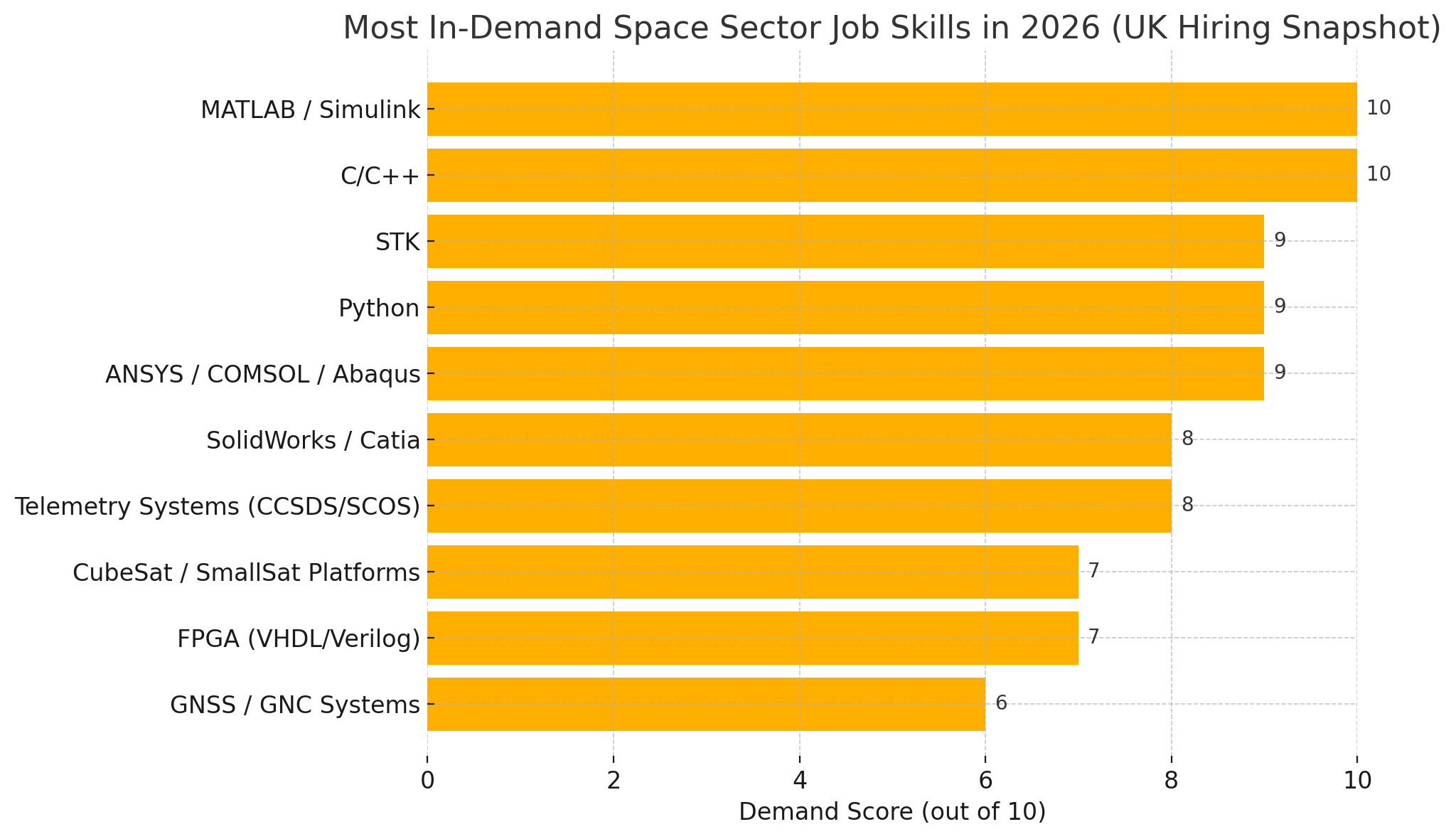
Space Sector Jobs Skills Radar 2026: Emerging Tools, Technologies & Platforms to Learn Now
From launch vehicles and CubeSats to space-based communications, climate monitoring, and lunar exploration—UK space jobs are entering a bold new era. With government investment, private capital, and ESA partnerships driving growth, demand is surging for professionals with the right skills to build and sustain this expanding space economy.
Welcome to the Space Sector Jobs Skills Radar 2026—your annual guide to the engineering tools, simulation platforms, programming languages and mission technologies that UK employers are prioritising. Whether you're an aerospace graduate, software engineer, or systems integrator, this radar helps you target the future of UK space careers.
Why Space Skills Are in Demand in 2026
The UK’s National Space Strategy and growing commercial sector are driving demand for talent who can:
Simulate and plan orbital mechanics, ground station coverage and payload schedules
Develop robust embedded software for satellite systems
Design and test space-grade structures and thermal systems
Process and interpret satellite data (SAR, EO, GNSS)
Ensure safety, compliance and sustainability across missions
Top Programming Languages for UK Space Careers
1. C/C++
What it is: Real-time programming languages used in satellite firmware, avionics and RTOS.
Why it matters: Enables onboard control, data handling and hardware interface.
Used by: Airbus Defence & Space, In-Space Missions, Surrey Satellite Technology Ltd (SSTL).
Roles: Satellite Software Engineer, Flight Software Developer.
Skills to pair: FreeRTOS, CAN bus, hardware abstraction layers.
2. Python
What it is: High-level scripting language used in satellite simulation, mission analysis and EO data processing.
Why it matters: Ideal for quick prototyping and scientific workflows.
Used by: Satellite analytics startups, RAL Space, ESA partners.
Roles: EO Analyst, Ground Segment Developer.
Skills to pair: NumPy, SciPy, GDAL, rasterio, Flask/FastAPI.
3. MATLAB / Simulink
Use case: Systems modelling, GNC algorithms, sensor fusion and signal processing.
Used by: Aerospace contractors, propulsion teams, academic mission design.
Roles: Guidance & Control Engineer, Dynamics Analyst.
Skills to pair: Simscape, Stateflow, embedded codegen.
4. Java / Rust
Use case: Ground segment software, secure communications, fault tolerance.
Used by: Operations software teams, cryptographic security.
Essential Tools, Frameworks & Platforms
1. STK (Systems Tool Kit by AGI/Ansys)
What it is: Mission planning and orbital mechanics simulation software.
Why it matters: Simulates satellite orbits, link budgets, visibility and ground station access.
Used by: Defence, commercial constellation operators, research teams.
Skills to pair: Scenario creation, sensor modelling, Python integration.
2. ESA SCOS-2000 / COSMOS
What it is: Ground control and telemetry/telecommand systems.
Why it matters: Standardised platform for satellite operations.
Used by: ESA, D-Orbit, Inmarsat.
Skills to pair: TM/TC protocol, packet structure, timeline scheduling.
3. Catia / SolidWorks / Fusion 360
What it is: CAD platforms for mechanical and structural design.
Why it matters: Supports design for launch loads, thermal stress and payload mounting.
Used by: Satellite manufacturers, NewSpace vehicle teams.
Roles: Payload Engineer, Aerospace Mechanical Designer.
4. Ansys / COMSOL / Abaqus
What it is: Structural, thermal, and multiphysics simulation suites.
Why it matters: Validates design integrity under extreme temperature and stress.
Used by: Launcher teams, deployable structures designers.
5. LabVIEW / TestStand
Use case: Ground testing, signal analysis, integration with HIL benches.
Used by: Space instrumentation teams, optical systems developers.
Earth Observation, GNSS & Space Data Tools
▸ SNAP (ESA Toolbox)
Use case: Processing data from Sentinel satellites.
Skills: Atmospheric correction, vegetation indices, band math.
▸ Google Earth Engine
Cloud-based geospatial processing.
Used by: Agriculture, disaster response, climate analytics.
▸ ArcGIS / QGIS
Visualisation and analysis of space-derived spatial data.
Roles: EO Analyst, GIS Specialist.
▸ SPICE Toolkit (NASA NAIF)
Ephemeris and spacecraft geometry modelling.
Used by: Deep space mission planners, planetary science teams.
Communications, Navigation & Control
▸ ADCS / GNC Modelling
Tools: MATLAB, STK, custom simulators.
Used by: SSTL, QinetiQ, aerospace primes.
▸ RF & Link Budget Simulation
Tools: STK, RF Toolbox, custom link calculators.
Roles: RF Systems Engineer, Antenna Modeller.
▸ GNSS Positioning & Corrections
Techniques: SBAS, RTK, PPP.
Used by: Earth science, precision mapping, autonomous satellite navigation.
Most In-Demand Space Sector Job Skills in 2026 (UK Hiring Snapshot)
Here’s a visual breakdown of the top software tools, languages, and platforms UK space employers are prioritising:

How to Future-Proof Your Space Career in 2026
Master MATLAB / Simulink & C/C++
These are must-haves for embedded flight software, GNC and simulation.Learn Satellite Mission Planning Tools
STK and SCOS-2000 are frequently mentioned in UK job specs.Pair Simulation with Hardware
CAD, structural analysis, FPGA & test frameworks like LabVIEW will set you apart.Understand the Space Stack
From CubeSat payloads to telemetry protocols, broad mission fluency is valuable.Engage with the UK Space Community
Follow the Satellite Applications Catapult, attend UK Space Conference, and join UKspace, the trade association for space companies.
Where to Find Space Jobs in the UK
🚀 Browse current UK-only space jobs at www.ukspacejobs.co.uk—from satellite engineering to EO analysis, software roles, and mission operations.
Conclusion: Your Space Career Toolkit for 2026
Whether you're designing CubeSats, writing onboard software, or analysing satellite imagery, the UK's growing space sector has room for diverse, skilled professionals. As competition grows, fluency in mission-critical tools and simulation platforms will define the next generation of space talent.
Use this Space Sector Jobs Skills Radar 2026 to prioritise your learning—and check back next year for fresh insight on what’s hot in UK space hiring.
Subscribe for weekly job alerts, career guidance, and insights from across the UK’s expanding space ecosystem.


